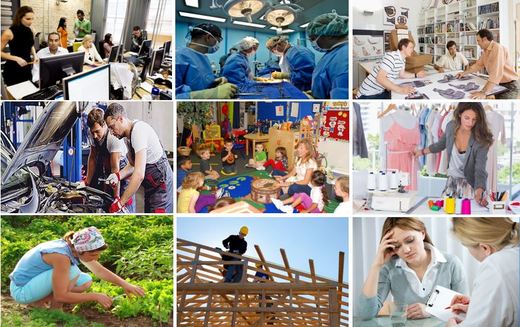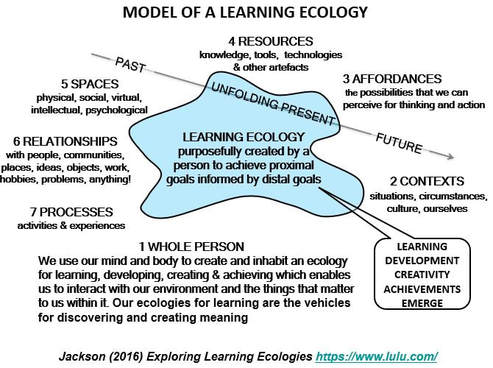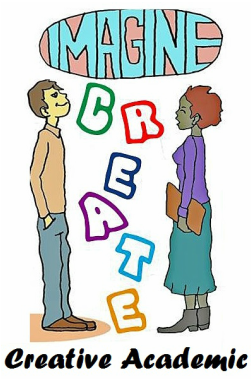
Higher education students are continually told that employers value creativity yet higher education seems to do little to encourage them to use their creativity. Furthermore, within our culture we are reluctant to talk about our own creativity. This is partly because it is considered inappropriate to publicly broadcast our own achievements and practices, and partly because we don't have the words to describe it in a meaningful way. Which is why people like Steve Jobs have helped by explaining creativity in simple down to earth language. "Creativity is just connecting things. When you ask creative people how they did something, they feel a little guilty because they didn't really do it, they just saw something. It seemed obvious to them after a while. That's because they were able to connect experiences they've had and synthesize new things."
If we want a more creative world there is a job to be done in encouraging people to share their own stories about being creative and what creativity means to them in their own everyday practices and circumstances. All too often in education we talk about creativity in a way that is not contextualized or situated in time, or a place, a circumstance, a culture, a problem or an opportunity that someone – a particular person, cares enough about to want to put effort and imagination into doing something that brings something into existence. But for creativity to have value beyond an individual: it must be relevant to others and a particular context or purpose.

Drawing on Carl Rogers’ ecological concept of creativity namely, ‘the emergence in action of a novel relational product growing out of the uniqueness of the individual on the one hand, and the materials, events, or circumstances of their life(1), we might visualize how creativity emerges from the ecologies of practice people create in environments that are not structured specifically for learning – like work (2,3).
By ‘practice’ we mean ‘action rather than thought or ideas’(4), ‘the application or use of an idea, belief, or method, as opposed to theories relating to it for example, the practice of teaching’(5). By ecology of practice, we mean the set of relationships and interactions a person creates in their environment and all the people, material and virtual things in their environment, in order to achieve a goal or fulfil a purpose (summarized in Figure 1). Through these personal stories we want to explore how creativity featured, or might feature, in a particular ecology of practice.
Figure 1 Learning ecology framework we are developing and evaluating
By ‘practice’ we mean ‘action rather than thought or ideas’(4), ‘the application or use of an idea, belief, or method, as opposed to theories relating to it for example, the practice of teaching’(5). By ecology of practice, we mean the set of relationships and interactions a person creates in their environment and all the people, material and virtual things in their environment, in order to achieve a goal or fulfil a purpose (summarized in Figure 1). Through these personal stories we want to explore how creativity featured, or might feature, in a particular ecology of practice.
Figure 1 Learning ecology framework we are developing and evaluating
To practice as a teacher, or perform any other complex role, involves a commitment to developing the skills, behaviours and ways of thinking that are necessary to fulfil the role in an effective, professional and creative manner. It is necessary to practice these ways of being ‘to perform (an activity) or exercise (a skill) repeatedly or regularly in order to acquire, improve or maintain proficiency in it.’(5) Another aspect of our project is to explore how practitioners develop themselves through practical experience, education and training to be able to practice in effective and creative ways. In this way we might connect the practices of teachers in higher education to the practices of practitioners in the world beyond formal education.
OPEN INVITATION
We want to encourage people to share their stories about how they use their creativity in their own work-related practice, or any other contexts where they regularly engage in practice eg pursuing a hobby or interest. Contributions will be shared through Creative Academic Magazine (CAM9) which will be published 4 times while the project runs between December 2017- December 2018
If you are interested in creating a similar written narrative or providing an oral narrative which can be transcribed, please contact the project leader Professor Norman Jackson [email protected].
To join this open collaborative project please visit
http://www.creativeacademic.uk/creativity-in-practice.html
Sources
1 Rogers, C.R., (1960) On becoming a person. Boston: Houghton Mifflin
2 Jackson N J (2016) Exploring Learning Ecologies Chalk Mountain / Lulu
3 Jackson, N. J. and Willis, J. (eds) Exploring Creative Ecologies Creative Academic Magazine Issue #5 September 2016 Available at http://www.creativeacademic.uk/magazine.html
4 Cambridge Dictionary available at https://dictionary.cambridge.org/dictionary/english/practice
5 Oxford Dictionary available at https://en.oxforddictionaries.com/definition/practise
OPEN INVITATION
We want to encourage people to share their stories about how they use their creativity in their own work-related practice, or any other contexts where they regularly engage in practice eg pursuing a hobby or interest. Contributions will be shared through Creative Academic Magazine (CAM9) which will be published 4 times while the project runs between December 2017- December 2018
If you are interested in creating a similar written narrative or providing an oral narrative which can be transcribed, please contact the project leader Professor Norman Jackson [email protected].
To join this open collaborative project please visit
http://www.creativeacademic.uk/creativity-in-practice.html
Sources
1 Rogers, C.R., (1960) On becoming a person. Boston: Houghton Mifflin
2 Jackson N J (2016) Exploring Learning Ecologies Chalk Mountain / Lulu
3 Jackson, N. J. and Willis, J. (eds) Exploring Creative Ecologies Creative Academic Magazine Issue #5 September 2016 Available at http://www.creativeacademic.uk/magazine.html
4 Cambridge Dictionary available at https://dictionary.cambridge.org/dictionary/english/practice
5 Oxford Dictionary available at https://en.oxforddictionaries.com/definition/practise

 RSS Feed
RSS Feed
